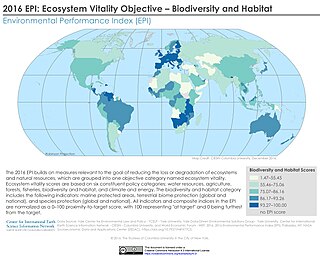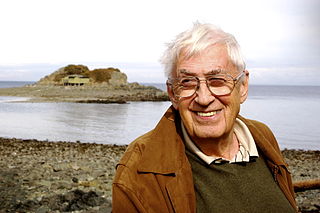
Human ecology is an interdisciplinary and transdisciplinary study of the relationship between humans and their natural, social, and built environments. The philosophy and study of human ecology has a diffuse history with advancements in ecology, geography, sociology, psychology, anthropology, zoology, epidemiology, public health, and home economics, among others.

Conservation biology is the study of the conservation of nature and of Earth's biodiversity with the aim of protecting species, their habitats, and ecosystems from excessive rates of extinction and the erosion of biotic interactions. It is an interdisciplinary subject drawing on natural and social sciences, and the practice of natural resource management.

Sir Arthur George Tansley FLS, FRS was an English botanist and a pioneer in the science of ecology.

Crawford Stanley "Buzz" Holling, was a Canadian ecologist, and Emeritus Eminent Scholar and Professor in Ecological Sciences at the University of Florida. Holling was one of the conceptual founders of ecological economics.
Ecology is a new science and considered as an important branch of biological science, having only become prominent during the second half of the 20th century. Ecological thought is derivative of established currents in philosophy, particularly from ethics and politics.
The Journal of Ecology is a bimonthly peer-reviewed scientific journal covering all aspects of the ecology of plants. It was established in 1913 and is published by Wiley-Blackwell on behalf of the British Ecological Society.

The British Ecological Society is a learned society in the field of ecology that was founded in 1913. It is the oldest ecological society in the world. The Society's original objective was "to promote and foster the study of Ecology in its widest sense" and this remains the central theme guiding its activities today. The Society had, circa 2024 around 7,000 members of which 14% are students. Of its members, 42% are outside the United Kingdom, in a total of 92 countries. The head office is located in London.

The Annual Review of Ecology, Evolution, and Systematics is an annual scientific journal published by Annual Reviews. The journal was established in 1970 as the Annual Review of Ecology and Systematics and changed its name beginning in 2003. It publishes invited review articles on topics considered to be timely and important in the fields of ecology, evolutionary biology, and systematics. As of 2023, Journal Citation Reports gave the journal a 2022 impact factor of 11.8, ranking it third of 169 journals in the "Ecology" category and third of 52 journals in "Evolutionary Biology". As of 2023, it is being published as open access, under the Subscribe to Open model.
Ecology and Society is a quarterly open access interdisciplinary academic journal published by the Resilience Alliance. It covers an array of disciplines from the natural sciences, social sciences, and the humanities concerned with the relationship between society and the life-supporting ecosystems on which human well-being ultimately depends. The journal's editors-in-chief are Marco Janssen and Lance Gunderson. C. S. Holling was the founding editor.

Ecography is a monthly peer-reviewed scientific journal published by Wiley on behalf of the Nordic Society Oikos covering the field of spatial ecology. It has been published since 1978, the first 14 volumes under the name Holarctic Ecology.
Cell Press is an all-science publisher of over 50 scientific journals across the life, physical, earth, and health sciences, both independently and in partnership with scientific societies. Cell Press was founded and is currently based in Cambridge, MA, and has offices across the United States, Europe, and Asia under its parent company Elsevier.

The Journal of Animal Ecology is a bimonthly peer-reviewed scientific journal publishing research in all areas of animal ecology. It began publication in 1932, and as such is the second oldest journal of the British Ecological Society.
Journal of Applied Ecology is a monthly peer-reviewed scientific journal publishing research in all areas of environmental management. It was established in 1964 and is published by Wiley on behalf of the British Ecological Society. The Senior Editors are Jos Barlow, Nathalie Pettorelli, Philip Stephens, Martin Nuñez and Romina Rader.

William James Sutherland is the Director of Research at the University of Cambridge Department of Zoology, and was previously the Miriam Rothschild Professor of Conservation Biology. He has been the president of the British Ecological Society. He has been a Fellow of St Catharine's College, Cambridge since 2008.
Jeannine Cavender-Bares is a Distinguished McKnight University Professor at the University of Minnesota in the Department of Ecology, Evolution & Behavior. Her research integrates evolutionary biology, ecology, and physiology by studying the functional traits of plants, with a particular focus on oaks.

Leonard James Webb was a widely awarded Australian ecologist and ethnobotanist who was the author or joint-author of over 112 scientific papers throughout the course of his professional career. His pioneering work as Senior Principal Research Scientist alongside Geoff Tracey in the CSIRO Rainforest Ecology Research Unit in the 1950s led to the publication of the first systematic classification of Australian rainforest vegetation in the Journal of Ecology in 1959.
Marc Johnson is a professor of biology at the University of Toronto Mississauga. He is the Canada Research Chair for Urban Environmental Science, and was the first Director of the Centre for Urban Environments from 2018-2023.










